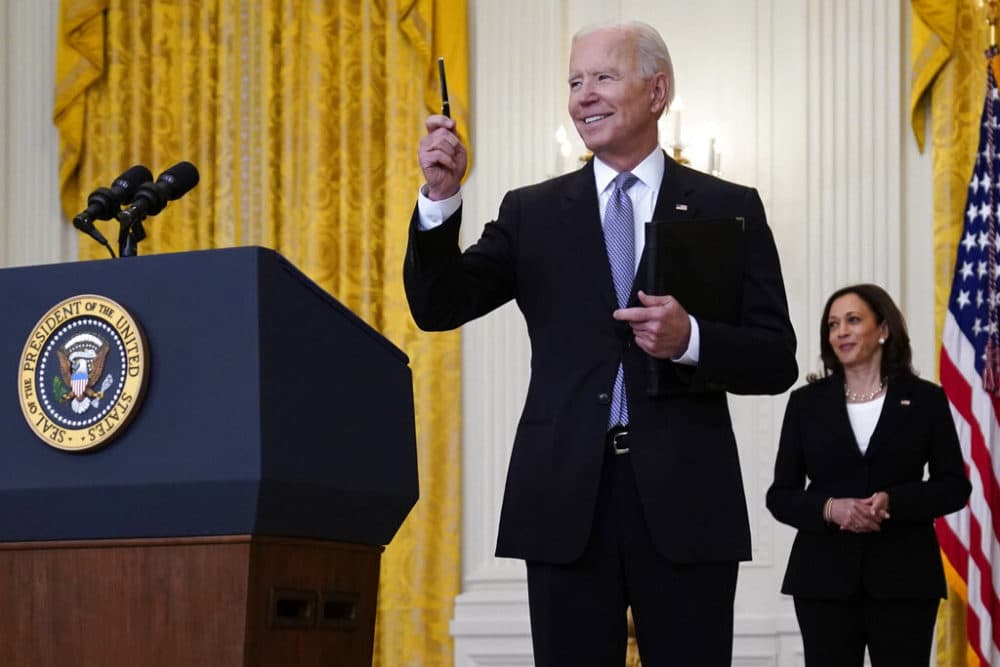Advertisement
Commentary
Biden's Big-Hearted $6 Trillion Budget Has One Big Omission — A Public Option

As we emerge from the pandemic, a survey finds Americans’ biggest financial concern to be “insufficient access to healthcare or health insurance.” One solution is precisely what’s absent from the fire hose of money Joe Biden wants to turn on the economy, via the $6 trillion budget he proposed last week. Somehow in that geyser of cash, the president couldn’t find a dollar for the “public option” he pitched during the presidential campaign.
Instead, he’s asking Congress to come up with a plan. Given the dicey politics — some health care providers already oppose a public option, which almost certainly would pay them less than private insurance — one imagines mutterings of “thanks, Joe” wafting through the Capitol, even as relevant Senate and House leaders gamely take up the challenge.
Biden needlessly cluttered their path forward. His public option seemed a bargain during last year’s primaries, costing a fraction (1/32nd, to be exact) of the price of Bernie Sanders’s Medicare for All. Sanders’s plan sank, despite its admirable simplicity, under the weight of sticker shock and Americans’ aversion to abolishing private insurance. But the capital gains tax increase Biden proposed to pay for the option during the campaign is now earmarked for other items in his budget. So his “$800 billion [health] plan may be almost as politically daunting as [Sanders’s] $32 trillion one,” Vox wrote.
Unless Congress refocuses Biden’s attention and spending, we may need to go Dutch on health care.
Actually, Dutch, German and Swiss. Those countries guarantee every citizen private health insurance, with the government as referee, setting minimum coverage benefits, requiring that everyone have insurance (the “individual mandate” loathed by libertarian types but upheld by the Supreme Court) and providing public subsidies. Would this approach be more affordable here than a public option, and more politically digestible? The answer may decide whether we shed our dubious mantle as Earth’s only developed country that doesn’t ensure everyone’s insured.
[H]ealth care reform can’t be an afterthought, even for a benevolent president.
This is more than a debate among wonks. Universal coverage would save lives and spare many people crushing medical debt. To be sure, Biden’s proposed budget would invest in infrastructure, child care and other needs, revealing a president who cares about all 328 million Americans. But health care reform can’t be an afterthought, even for a benevolent president.
Paying for reform is not the only hurdle. To be sustainable, universal coverage — whether public option or the Dutch/German/Swiss model — must impose Newtonian physics on U.S. medical costs: What’s gone up to world-leading levels must come down.
Harvard research exonerated many of the usual suspects behind those runaway costs. We don’t do more expensive tests and procedures than other countries; we don’t have more lavishly paid specialists; we don’t spend much less on health-conferring social programs. Medical education does cost more here than elsewhere, but not enough to account for the income premium American doctors earn over their international peers. Rather, the researchers said, our health system price-gouges, pure and simple. As CNBC summarized the findings, “Drugs are more expensive. Doctors get paid more. Hospital services and diagnostic tests cost more.”
Advertisement
A workable public option would pin prices to the mat by paying less than private insurers (as Medicare does) and requiring health care providers to accept its enrollees, as well as the privately insured. Paying less means the public plan could charge lower premiums than its private competitors, who, to keep customers, would demand lower prices from doctors and hospitals to hold down their own premiums. Providers would have to yield or else watch Americans flock to the public option, sticking the caregivers with that plan’s lower reimbursements. Hence the outcry against the public option.
The Netherlands, despite all-private insurance, also uses the state to muscle down prices. Vox notes that the government “sets limits on how much health spending can accrue in a given year and has the authority to impose budget cuts if spending exceeds that limit. Prices are also set for particular services, like after-hours primary care. Insurers do have some limited flexibility in which providers they contract with, but the government sets their health care budget for them.”
Which approach is more likely to fly here? A pair of U.S. scholars, though partial to the European model on the merits, back a public option on the politics. The Europeans’ approach would mean abolishing Medicare, since everyone, including seniors, would have private insurance, and the duo thinks that that’s an impossible ask of Americans. If they’re right, Democrats should pursue the public option. But they may be wrong.
After all, private Medicare Advantage plans, an alternative to government Medicare, are so popular that they’ll likely cover almost half of seniors by 2029. (They need better regulation, which could accompany folding them into a universal health plan.) Moreover, the European approach isn’t utterly alien here. Maryland adopted it, capping hospital prices and spending growth.
Critics complained that Donald Trump’s Obamacare mantra — “repeal and replace”-- had no second half. That was grossly unfair, as Trump clearly had a replacement in mind: retrogressing to the pre-Obamacare hash that was U.S. health care financing.
That presidential indifference is gone, thank God, but not the daunting politics of reform. Those demand that President Biden call the play — public option or an alternative — and then run with the ball, not hand it off to Congress.
